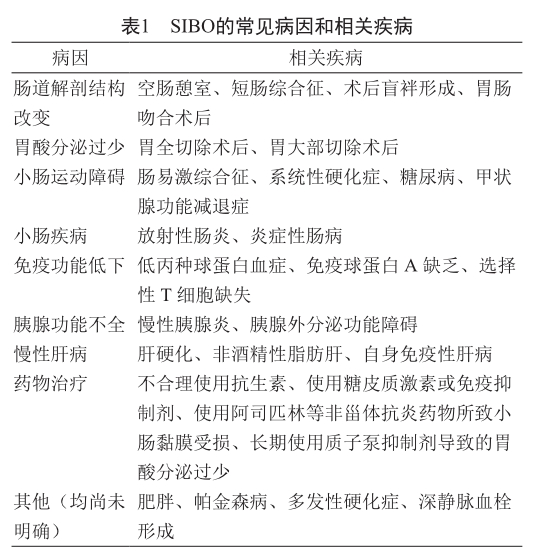小肠细菌过度生长与慢性肝病(1)
摘 要 小肠细菌过度生长(small intestinal bacterial overgrowth, SIBO)以小肠细菌种类改变和(或)数量增加为特征,常见的危险因素包括胃肠解剖结构改变、胃酸分泌过少、小肠运动障碍、免疫功能低下、胰腺功能不全和慢性肝病等。SIBO诊断的金标准为小肠液细菌培养。氢呼气试验具有无创、简便和可重复性的特点,现已成为临床上最常用的SIBO诊断方法。同时检测呼气中的甲烷丰度有助于提高SIBO的检出率。荟萃分析发现,36% ~ 68%的慢性肝病患者合并有SIBO。肝硬化伴门脉高压患者合并SIBO会促进肝硬化并发症的发生。以微生物学为基础的治疗可调整肠-肝轴的运转、减少SIBO,由此改善肝硬化患者的预后。肠道不吸收的抗生素是治疗SIBO最有效的药物。
关键词 小肠细菌过度生长 氢呼气试验 慢性肝病
中图分类号:R575; R363.21 文献标志码:A 文章编号:1006-1533(2019)15-0003-04
Small intestinal bacterial overgrowth and chronic liver disease
CHEN Ying1*, CHEN Shiyao1, 2**[1. Department of Gastroenterology, Minhang Hospital, Fudan University (Central Hospital of Minhang District), Shanghai 201199, China; 2. Department of Gastroenterology & Hepatology, Zhongshan Hospital, Fudan University, Shanghai 200032, China]
ABSTRACT Small intestinal bacterial overgrowth (SIBO) is characterized by the alteration of bacterial species in the small intestine and their number increase. The risk factors of SIBO include anatomical alteration, dysmotility, immunodeficiency, pancreatitis, and chronic liver disease. Culture of intestinal aspirates is the gold standard for SIBO diagnosis. The hydrogen breath test, noninvasive, simple and repeatable technique, became the most common method to assess patients for SIBO. Measurement of exhaled methane helps with the positive rate. A meta-analysis indicated that SIBO was found in 36% - 68% of chronic liver disease patients and has been linked to the progression of cirrhosis and its complications. Therapy targeting gut microbiota which affects gut-liver axis is beneficial to improve the prognosis of cirrhosis. Antibiotics that are not absorbed in the intestine may be the most effective drugs for the treatment of SIBO.
KEy WORDS small intestinal bacterial overgrowth; hydrogen breath test; chronic liver disease
小肠细菌过度生长(small intestinal bacterial overgrowth, SIBO)是一种以小肠细菌种类改变和(或)数量增加为特征,并表现为腹胀、腹痛、腹泻等非特异性症状的临床综合征[1]。肠道解剖结构异常、小肠运动障碍、胃内pH改变、免疫功能低下是常見的导致SIBO的原因[2]。慢性肝病、尤其是肝硬化患者由于小肠微绒毛受损以及胃肠道、肝、胆和胰腺等脏器的分泌减少,使得肠道微循环被破坏和胃肠道局部免疫防御机制受损,导致肠道菌群失调,结肠细菌向小肠上移,发生SIBO[3]。SIBO会进一步加剧肠黏膜屏障功能损伤、细菌易位和内毒素血症的程度,加重肝损伤。因此,SIBO—肠源性内毒素血症—肝病形成了一个恶性循环。本文就慢性肝病中有关SIBO发生和治疗的研究进展作一概述,以期为慢性肝病治疗提供一个新的研究方向。
1 慢性肝病中SIBO的发生机制
健康人体内有一系列内源性的机制维持小肠细菌数量及其组成的稳定,如胃酸和胃蛋白酶破坏细菌、胆汁和胰酶抑制小肠细菌生长、小肠移行性复合运动将肠内容物推向结肠、回盲瓣防止结肠内容物反流入小肠等。因此,SIBO的常见危险因素包括肠道解剖结构改变、胃酸分泌过少、小肠运动障碍、小肠疾病、免疫功能低下、胰腺功能不全和慢性肝病等[4]。SIBO的常见病因和相关疾病见表1。 , 百拇医药(陈颖 陈世耀)
, 百拇医药(陈颖 陈世耀)
关键词 小肠细菌过度生长 氢呼气试验 慢性肝病
中图分类号:R575; R363.21 文献标志码:A 文章编号:1006-1533(2019)15-0003-04
Small intestinal bacterial overgrowth and chronic liver disease
CHEN Ying1*, CHEN Shiyao1, 2**[1. Department of Gastroenterology, Minhang Hospital, Fudan University (Central Hospital of Minhang District), Shanghai 201199, China; 2. Department of Gastroenterology & Hepatology, Zhongshan Hospital, Fudan University, Shanghai 200032, China]
ABSTRACT Small intestinal bacterial overgrowth (SIBO) is characterized by the alteration of bacterial species in the small intestine and their number increase. The risk factors of SIBO include anatomical alteration, dysmotility, immunodeficiency, pancreatitis, and chronic liver disease. Culture of intestinal aspirates is the gold standard for SIBO diagnosis. The hydrogen breath test, noninvasive, simple and repeatable technique, became the most common method to assess patients for SIBO. Measurement of exhaled methane helps with the positive rate. A meta-analysis indicated that SIBO was found in 36% - 68% of chronic liver disease patients and has been linked to the progression of cirrhosis and its complications. Therapy targeting gut microbiota which affects gut-liver axis is beneficial to improve the prognosis of cirrhosis. Antibiotics that are not absorbed in the intestine may be the most effective drugs for the treatment of SIBO.
KEy WORDS small intestinal bacterial overgrowth; hydrogen breath test; chronic liver disease
小肠细菌过度生长(small intestinal bacterial overgrowth, SIBO)是一种以小肠细菌种类改变和(或)数量增加为特征,并表现为腹胀、腹痛、腹泻等非特异性症状的临床综合征[1]。肠道解剖结构异常、小肠运动障碍、胃内pH改变、免疫功能低下是常見的导致SIBO的原因[2]。慢性肝病、尤其是肝硬化患者由于小肠微绒毛受损以及胃肠道、肝、胆和胰腺等脏器的分泌减少,使得肠道微循环被破坏和胃肠道局部免疫防御机制受损,导致肠道菌群失调,结肠细菌向小肠上移,发生SIBO[3]。SIBO会进一步加剧肠黏膜屏障功能损伤、细菌易位和内毒素血症的程度,加重肝损伤。因此,SIBO—肠源性内毒素血症—肝病形成了一个恶性循环。本文就慢性肝病中有关SIBO发生和治疗的研究进展作一概述,以期为慢性肝病治疗提供一个新的研究方向。
1 慢性肝病中SIBO的发生机制
健康人体内有一系列内源性的机制维持小肠细菌数量及其组成的稳定,如胃酸和胃蛋白酶破坏细菌、胆汁和胰酶抑制小肠细菌生长、小肠移行性复合运动将肠内容物推向结肠、回盲瓣防止结肠内容物反流入小肠等。因此,SIBO的常见危险因素包括肠道解剖结构改变、胃酸分泌过少、小肠运动障碍、小肠疾病、免疫功能低下、胰腺功能不全和慢性肝病等[4]。SIBO的常见病因和相关疾病见表1。
 , 百拇医药(陈颖 陈世耀)
, 百拇医药(陈颖 陈世耀)